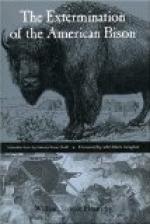IV. CONGRESSIONAL LEGISLATION FOR THE PROTECTION OF THE BISON.
The slaughter of the buffalo down to the very point of extermination has been so very generally condemned, and the general Government has been so unsparingly blamed for allowing such a massacre to take place on the public domain, it is important that the public should know all the facts in the case. To the credit of Congress it must be said that several very determined efforts were made between the years 1871 and 1876 looking toward the protection of the buffalo. The failure of all those well-meant efforts was due to our republican form of Government. Had this Government been a monarchy the buffalo would have been protected; but unfortunately in this case (perhaps the only one on record wherein a king could have accomplished more than the representatives of the people) the necessary act of Congress was so hedged in and beset by obstacles that it never became an accomplished fact. Even when both houses of Congress succeeded in passing a suitable act (June 23, 1874) it went to the President in the last days of the session only to be pigeon-holed, and die a natural death.
The following is a complete history of Congressional legislation in regard to the protection of the buffalo from wanton slaughter and ultimate extinction. The first step taken in behalf of this persecuted animal was on March 13, 1871, when Mr. McCormick, of Arizona, introduced a bill (H. R. 157), which was ordered to be printed. Nothing further was done with it. It read as follows:
Be it enacted, etc., That, excepting for the purpose of using the meat for food or preserving the akin, it shall be unlawful for any person to kill the bison, or buffalo, found anywhere upon the public lands of the United States; and for the violation of this law the offender shall, upon conviction before any court of competent jurisdiction, be liable to a fine of $100 for each animal killed, one-half of which sum shall, upon its collection, be paid to the informer.
On February 14, 1872, Mr. Cole, of California, introduced in the Senate the following resolution, which was considered by unanimous consent and agreed to:
Resolved, That the Committee on Territories be directed to inquire into the expediency of enacting a law for the protection of the buffalo, elk, antelope, and other useful animals running wild in the Territories of the United States against indiscriminate slaughter and extermination, and that they report by bill or otherwise.
On February 16, 1872, Mr. Wilson, of Massachusetts, introduced a bill in the Senate (S. 655) restricting the killing of the buffalo upon the public lauds; which was read twice by its title and referred to the Committee on Territories.
On April 5, 1872, Mr. B. C. McCormick, of Arizona, made a speech in the House of Representatives, while it was in Committee of the Whole, on the restriction of the killing of buffalo.




